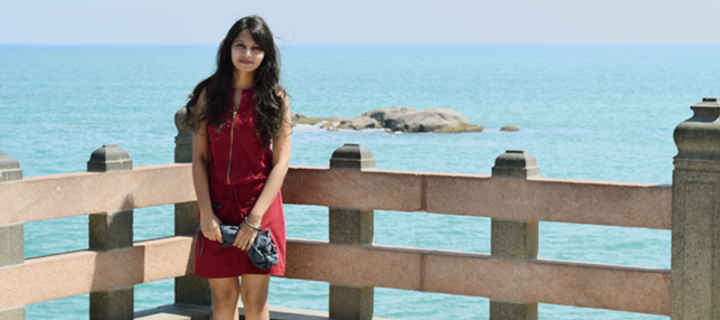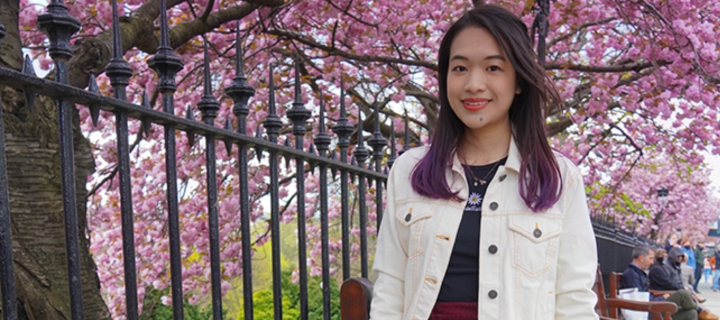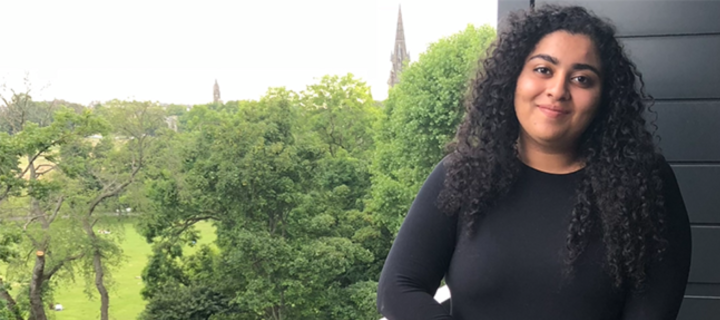Joint PhD's through the pandemic: 4 students share their experience
Four joint PhD scholars at the University, who are combining their research at European universities, talk about their scholarships, the importance of collaboration and how they’re handling student life through the Covid-19 pandemic.
Diana Jerome

Diana is a PhD student at Edinburgh’s School of Geosciences working in collaboration with the University of Helsinki as part of the Partnership Programme on Forest. Her research is focused on comparing climate sensitivity of tundra and boreal shrubs with the aim to understand how these ecosystems respond to changes in temperature, precipitation, and season length. Since beginning her PhD in March 2021 she’s had the additional challenge of working remotely from the USA.
It can be difficult to motivate myself while working from home. Because I started my PhD remotely, I had a hard time recognizing my own accomplishments because they all happened isolated in my apartment. I find that making a lot of small weekly goals helps me stay accountable with doing work and allows me to look back and celebrate all the work I have done. I also feel that is it important to be gentle with yourself, you are going to have productive days and unproductive days, it does not help to fret over not getting enough done.
Diana is now in the process of moving to Edinburgh to continue her studies.
While my work so far has been confined to my apartment, I am currently in the process of moving to Edinburgh, which is very exciting! As an international student my scholarship has allowed me to come there to do my PhD.
The collaborative format of her PhD during a pandemic has given her a new perspective on the benefits of university partnerships.
Collaboration is a critical part of scientific research in general and having official university partnerships helps formalise these collaborations. I think in some ways the pandemic has broadened our view of collaboration. For example, when organizing a seminar, you are not confined to who may be able to attend in person. If everyone if tuning in from their own home, you can invite speakers from many countries to participate.
Sweta

Sweta is working at the University of Edinburgh and KU Leuven, primarily based in a research laboratory at the Centre of Cardiovascular Science. Her PhD research focuses on exploring the heterogeneity of endothelial cells, a cell type that line the blood vessels in our bodies, in patients with Pulmonary Arterial Hypertension.
She described some challenges and highlights of her experience so far.
Moving to a new country has been very exciting for me. When I got to know that I’d be moving to Edinburgh my excitement level was through the roof and so was my anxiety! I was swinging between the thoughts of how my life would be in Edinburgh and apprehensive about how the city would treat me. To be honest, I’ve loved every bit about the city, even the infamously changing weather. I’ve met some amazing people and got a chance to explore the beautiful spots of the city.
Sweta talked about the personal importance of European university partnerships.
Among several other reasons, access to the expertise of the two well established laboratories is the main highlight. I have access to the top researchers in two different areas of research so help is always at hand! And not to mention, the exposure to two different research cultures and the opportunity to live in different European countries which will boost my adaptability.
Nelly Mak

Nelly is on a Joint Scholarship PhD programme in Infection Medicine with the University of Edinburgh and the University of Leiden. It’s a four-year PhD specialised in infection and immunity; the project involves studying an antiviral protein called IFITM, which is expressed by cells to protect from viruses such as HIV-1, influenza virus and some coronaviruses. She investigates how IFITM differs between mammalian species and what this variation means with regards to zoonoses, the jump of viruses from one species to another.
The field of my research is more important now than ever due to the ongoing Covid-19 pandemic caused by SARS-CoV-2, which is believed to originate from bats. The learning curve of a PhD is very steep and can be challenging at times, but I really enjoy the learning opportunities and personal growth it brings. Despite only being 8 months into my PhD, I have learnt a lot of wet lab techniques and have grown to be more confident about my research.
Nelly considered the highlights of her studies so far.
A highlight of my PhD study so far is definitely meeting people from very diverse backgrounds and learning more about their culture and experiences. I have also enjoyed discussions with researchers based in other countries at conferences or scientific meetings since I can learn about the way research is conducted varies.
On the topic of university partnerships, she shared these thoughts.
Collaborations and exchange of ideas are vital for making progress in science. European university partnerships help foster productive connections between institutions in different countries and bring innovations that may give rise to new research ideas or breakthroughs. I believe that living and experiencing the research culture in different countries are beneficial for everyone, particularly for researchers like me, because we gain a lot of academic knowledge and transferrable skills from these experiences that facilitate our careers.
Rainha Passi

Rainha is pursuing a joint PhD programme with the University of Edinburgh and KU Leuven. Primarily based in Edinburgh, and in frequent communication with her other lab in Leuven, she has adopted a hybrid work system between labs in the Edinburgh Bio Quarter and working from home. Her research is in regenerative medicine specifically focussing on the cardiovascular system to investigate how a cellular layer within blood vessels, called the endothelium, can be influenced to promote repair and regeneration following an illness.
I have been given a lot of opportunities in the past year to learn new skills, including bioinformatics, imaging, abstract writing, and lab skills! I’ve also had a unique opportunity to do an additional project in Covid-19 research which has been a very interesting and rewarding experience. Knowing I am a part of a global effort to better fortify healthcare systems by contributing to our understanding of the virus and subsequent disease is a deeply humbling experience and a definite highlight for my PhD so far.
Rainha commented on how European university partnerships provide a strong foundation for early career researchers.
From a professional standpoint, the European university partnership provides such an excellent platform for students to build an inter-university professional scientific network. This simultaneously provides an early career researcher, such as myself, with the knowledge of advanced technologies and discoveries from the forefront of the field with the added instruction and scientific skill of so many brilliant scientists across the partnership.
Learn more about our work in Europe
Visit our European regional page

